- Home
- James Axler
Apocalypse Unborn Page 11
Apocalypse Unborn Read online
Page 11
“You two signed on to train and fight along with the others. Sorry, no pets allowed.”
“Well, consider us unsigned.”
Graydon Bell didn’t give two hoots in hell about the baby scagworms, or how they got paid for them. What he and Kirby were looking for was a quick handle on the island’s personnel and their pecking order. Intel they could convert to their advantage.
The blond man stepped forward and with authority said, “Now that you’re here, you can’t back out.”
Before his cryogenesis, Colonel Bell had played in the Big Show, the Pentagon-DOD league, the byzantine corridors of power, intrigue and one-upmanship. A world-champion button pusher, he knew how to read people and their weaknesses. He read the guy as a total fruit loop, his psyche a squirming pile of contradictions, of desires and fears working at cross purposes. From the top of his too tall head to his size thirteen feet, the guy radiated arrogance, vanity, insecurity and, oh, yes, self-loathing.
“Surrender the muties and take your chit,” Silam ordered. “I guarantee you’ll be paid in gold later.”
“Who the fuck are you?” Bell shouted in his face. “This is Magus’s op. We want to see Magus. We want to talk to Magus.”
Button pushed. Ding-ding. He was not in charge.
Silam’s pale face and high-rise forehead rapidly took on an unhealthy ruddy glow.
Bell had to give the guy credit, though. He didn’t respond by shouting back or reaching for a hidden weapon. He didn’t do anything stupid. Instead he signaled for backup, which was smart.
The colonel took one look at the 300-pound enforcer and started shrugging out of his tube frame’s back straps. As he passed over the scagworms to Eng, he saw the self-satisfied expression on the blond man’s face. The guy actually thought he’d won. But he’d lost. Bell had neatly established the island’s chain of command. And if necessary, the top-to-bottom chill sequence he and Kirby would follow.
Before that moment, Bell’s greatest concern was that the one in charge might be the naked ugly thing, whose desires and intent he couldn’t read. Unlike four-star generals, chairmen of congressional subcommittees, captains of the military-industrial complex or his whitecoat research competitors, it was a closed box. Inscrutable. Alien. There was no exposed button to push, no obvious weakness to exploit, no way to manipulate it to his advantage.
For a reason that had nothing whatsoever to do with outward appearance, it reminded Bell of a Kodiak bear, a creature capable of almost unthinkable violence whose trigger was internal, accessible only to itself. Looking into the enforcer’s slitted yellow eyes, he had no clue as to what flipped its switch, just the feeling that it was either on or off.
Kill now or kill later.
After Kirby handed over his rack of tubes to Eng, he snatched the payment chit and stuffed it in his pants’ pocket. Like the people in line in front of them, they weren’t asked to give up their weapons before they hopped the barrier.
Well short of the end of the pier, Bell caught his partner by the arm and said, “Let’s wait for the geezer.”
“We need to start breaking the news to him,” Kirby said. “Get an idea of how he’s going to react before he goes off and rejoins his pals.”
Bell nodded in agreement. The inevitable reunion of Doc Tanner and his companions presented a problem. They didn’t know exactly when or how Doc and friends were going to make their move, but had no doubt that a move of some kind was upcoming. From the gaudy house stories they’d heard about the crew’s past exploits, they were certain that signing on with Magus’s free-booters to pillage the hellscape was not the real agenda. From the companions’ reputation, it was more likely some kind of preemptive strike against the recruitment operation. Or a rip-off. Or an assassination attempt. Or even a bit of all three. Once Doc linked up with his running buddies and their plan was put in motion, the main chance for winning him over peacefully was lost. Taking him by force was a last resort.
“How do you want to work this?” Kirby asked. “Two on one, or one on one?”
“We’d better make it one on one. Tanner will be less likely to get his panties in a twist that way. Find us a campsite, and I’ll lay it out for him, as gently as I can.”
Bell leaned on the pier’s rail, watching Doc amble toward him. All their effort, their suffering, their sacrifice had come down to this. For an instant, desperation fluttered like a big fat moth in the back of his throat. Powdery wings beating. Beating. He wanted his kids to grow up, even if he wasn’t around to see it. He wanted his wives to grow old. He wanted his world to endure. Bell swallowed hard, crushing the imaginary bug to pulp. The skinny man in the frock coat was the key to undo, to resurrection. He could return life to those it had been stolen from. At least in theory, he could do it by taking a single step forward at the right moment. The question was, would he take that step if given the chance? Would he do it if he knew the likely consequences to his companions?
Doc stopped beside him and gestured at the rocky beach and rude dwellings with his ebony stick. “It was on tiny, remote, lifeless islands like this that Roman emperors exiled their political enemies and troublesome relatives. Suetonius writes that the Lady Agrippina endured exile in such a place, the victim of Tiberius Caesar’s treachery.”
“Gaius Suetonius Tranquillis,” Bell said. “Sex and violence, circa second century A.D.”
Doc gave him a stunned look. “You know his work?”
“Through a series of filters. I saw some television films based on the books of the poet Robert Graves, which were based on the histories of Suetonius.”
“You saw these films recently?”
“Only you and I would call a hundred years ago recently, Dr. Tanner.”
Doc pulled back to a proper fighting distance, switching the swordstick to his weak hand and tucking the tail of his long coat behind the walnut grips of his LeMat. “You have the advantage of me, sir,” he said. “I know you by a number around your neck, not a name. Who are you? And more to the point, what do you want from me?”
Bell licked the ball of his thumb and used it to draw a clean stripe down his right cheek. Under the cracked white paint were many small red dots. In clusters. They weren’t from birdshot. “I’m a freezie,” he said. “I went into cryosleep days before the nukecaust.”
“You and your large friend?”
“Yes. We went under at the same time, in the same place. My name’s Bell. His is Kirby.”
“If I may ask, what prompted you to consign yourselves to deep cold prior to Armageddon?”
“I suppose you could say it was a premonition of doom.”
“Any charlatan psychic could make that prediction, but few, if any, could act upon it in the manner you describe. How did you come by this ‘premonition’ and how did you get access to the machinery of cryogenesis?”
“You already know the answer.”
“You’re whitecoats,” Doc said, practically spitting the words.
“Not just any whitecoats,” Bell corrected him. “Dr. Kirby and I were theoreticians, pure researchers. Although we were funded by Operation Chronos.”
“Chronos!” Doc exclaimed, his hand dropping to the LeMat’s grip, murder flashing in his eyes. “By the fires of hell—”
Bell held up a palm, begging for patience. “We worked independent of that bureaucracy,” he said, “without close supervision, in areas of our particular professional interest. In the course of our investigations into some unusual electromagnetic phenomena, we got a glimpse of the near future. Our computer models predicted doomsday.”
“And so you decided to desert the ship you helped scuttle.”
“That is an oversimplification based on insufficient facts, as you well know.”
“If you and Dr. Kirby were able to anticipate the nukecaust based on a computer model,” Doc said, “the primary cause must have been evident. It had to be part of the calculations. So tell me, what precipitated the world blowing apart?”
Graydon Bell had read Tan
ner’s Chronos files a hundred times. He and Kirby had discussed their implications endlessly, both before and after their cryosleep. Theophilus Algernon Tanner was obsessed with guilt over leaving his young family to an unknown fate. Tanner’s suffering was a mirror image of Bell’s. A button in common.
He looked Doc straight in the eye and said, “It was you, Dr. Tanner. You caused the end of the world.”
Before he could get another word in, Doc had the big black-powder blaster out of its hand-tooled holster, his thumb on the hammer spur.
“The second time jump you made, from 1998 to Deathlands, was the pivotal event,” Bell told him.
“If you know about that, then you know it was not of my choosing. Nor was the initial jump. I was taken against my will.”
“Yes, you were. But the hard fact is this—when your physical form was transported from the twentieth century to the near future, damage was done to the fundamental structure of existence, to what Dr. Kirby and I choose to call supra-time/space.”
“You can call it anything you want. What proof do you have of any of this?”
“In the beginning all our proofs were mathematical. Rational, not empirical. But they led us to suspect that a vantage point outside our own existence might exist. After you were trawled from November 1896 by Dr. Herman Welles, Kirby and I began monitoring subtle changes at the submolecular level. That damage was the first indirect evidence we had of s-t/s. We tried to persuade Dr. Welles and others in power to call off further Chronos experiments until our data could be analyzed elsewhere and the results independently confirmed. Despite our warnings, you were sent on to the future.”
“The consequences being?”
“Almost imperceptible electromagnetic shifts, which at first caused only minor, isolated problems in the world’s most sensitive and sophisticated computer systems. The problems were kept out of the news for national security reasons, and because their impact on performance was negligible. The troubles were blamed on viruses and on faulty software and hardware. In less than a month, the random charge shifts suddenly cascaded, disabling the nuclear failsafes and triggering an immediate, all-out global exchange.”
“I was the instrument that destroyed your world.”
“Yes.”
“Apropos, as you destroyed mine.”
“What if I told you it wasn’t destroyed.”
“I’d say you were stark raving mad. My world is dust. Yours is ashes. I repeat my original question, what do you want from me, sir?”
“I want your help in undoing what has been done.”
“As if such a thing were possible!”
“I assure you it is. Dr. Kirby and I didn’t freeze ourselves to escape the nukecaust. We did it so we could come to Deathlands and find you. Gaining access to files to discover how far into the future you were sent was very difficult. We took a calculated risk that we would actually thaw on the preset dates.”
“I am flattered to be sure, but I fail to see where all this is leading.”
“There is a way back to your Emily, to Rachel and little Jolyon. It already exists. It is within reach. We can show it to you.”
Doc drew back the hammer to full cock. “I should destroy you now, like a rabid dog.”
“If you do, you’ll never know if I’m telling the truth. You’ll never know if you could have seen their faces again, if you could have lived the life that was stolen.”
The old man let the sights of the LeMat drop from the man’s crotch to the planking at his feet.
“There is only one stipulation to the deal,” Bell said, “and it is nonnegotiable.”
“Why doesn’t that not surprise me?”
“You can’t mention any of this to your companions. Not a word about what I have offered.”
Doc was incredulous. “Assuming your offer is bonafide, you expect me to take my leave of Ryan and the others without saying goodbye? These are my dearest friends, my battlemates.”
“Goodbyes are overrated. It’s the hellos that count. Especially to a long lost family.”
“I don’t understand….”
“When you leave with us for the past, your existence in Deathlands will be completely erased. If you were never trawled from Nebraska in 1896, you could never have arrived here. What’s the point of saying goodbye to people who won’t remember you a nanosecond after you go?”
Doc seemed to wobble on his feet, as if from a physical blow. The possibility had finally sunk in that this might be the answer to all his prayers. He reholstered the pistol with difficulty, then leaned hard on his swordstick. “I need time to think,” he said.
“Go ahead and think, but remember, if you say anything to Cawdor or the others, the offer is withdrawn. You will remain in Deathlands forever. Your family will be forever dead to you.”
Doc nodded, still dazed.
Bell hadn’t told him everything that he and Kirby knew. The truth didn’t depend on obscure mathematics; it was simple Aristotelian logic. Caught up in the resurgence of lost hope, Doc wasn’t thinking in an organized way. He hadn’t asked the most pertinent question.
Perhaps the truth would dawn on him someday, a eureka moment after he returned to his own time.
For everything there is a price.
Caveat emptor.
Chapter Twelve
From his position at the end of the long line leading up to the barricade, Jak Lauren watched the exchange between Doc and the mutie hunter. He was too far away to hear any of what was being said, but whatever it was, Doc took serious offense. His antique handblaster cleared leather in a blur, and for a second it looked like he was going to cut loose on the empty-handed, rapidly talking man.
Jak knew he had seen the guy before, him and his black partner. And he knew just where: in a rowdy, trailerhouse gaudy beside a fallen Interstate 15 overpass southwest of the ruins of Vegas, the companions’ last stop before making the jump to California.
Forget about that eighteen-inch-high dreadlocked topknot, the white paint had struck a deep and sensitive nerve. When Jak had glimpsed that pale, gaunt face across the crowded, smoky saloon, his heart jumped and he dropped his spoon into the plate of hot chicken pie he was gobbling. For an instant he actually thought he’d found another albino. Without a word he left his friends at the low, corner table. When he moved closer to the man, he saw the troweled-on pigment and brown eyes.
Not an albino.
A seedy clown.
Embarrassed and angry at himself, Jak had turned away before the man noticed him. Or so he’d thought.
When he’d seen the pair again, belowdecks on the white ship talking with Doc Tanner, his hackles had gone up, bigtime. Jak could only think of one way the mutie hunters could have gotten to Morro Bay so fast. Unless they had sprouted—and subsequently lost—wings, they, too, had used a mat-trans gateway. And it had to have been the same one the companions used. The mutie hunters had either followed Jak and the others to the desert mountain redoubt, or they had known it was there all along. And they knew enough about gateway operation to follow the companions.
What the pair was after wasn’t clear. Jak realized it might not have anything to do with the companions. The mat-trans jump could have been the easiest way for them to reach the Morro Bay rendezvous point. Or it could have been something more sinister. The agreed-upon mission rules left Jak in a bind. Until they were in position to make their assault, the companions were supposed to keep strict distance, and not intervene on each other’s behalf. It was every man for himself, with the exception of Mildred and Krysty, who were teamed up.
Not wanting to endanger his friends or the mission, Jak had kept a discreet eye on the situation. There was no doubt Doc could handle whatever the mutie hunters dished out. And it was always possible that he already knew about their mat-trans jump, that the men had volunteered the information. It was also possible that Doc remembered them from the gaudy’s pie parlor, so a warning was unnecessary.
When the taua broke into the galley and the mutie h
unters saved Doc’s life, Jak figured he had made the right decision. Now that things had taken a sudden 180, he was having second thoughts.
Doc cocked the LeMat and aimed it at the man’s painted forehead. The range was no more than five feet. Jak could see the tension in the old man’s arm and raised hand, and knew the trigger was drawn right up to break point. Life and death were separated by an ounce or two of finger pressure. The mutie hunter stood his ground, looked down the .44-caliber bore and kept talking. After a bit, Doc’s aim wavered, then dropped. When he slid the LeMat back into its holster, his shoulders slumped and he seemed to stagger on his feet. Only his swordstick kept him upright.
Whatever the mutie hunter had said to Doc, it devastated him. As the old man moved down the pier toward the island, he dragged himself along stiff-legged and slow. Jak could only watch and worry. Doc’s brain had a tendency to overload, to vaporlock, a product of the damage done to him by the Operation Chronos whitecoats. It was hard to know what would set it off, or how long the problem would last. Sometimes it was over in a matter of seconds. Under the circumstances, all Jak could do was hope for the best.
It took quite a while for him to reach the barricade, which gave him plenty of time to size up the mutie enforcer. It was big and solid, but it looked quick on its feet, too. It had that slumbering horror feel—like it could go from cat nap to blood bath in the blink of a yellow eye. Taking in the thick, armored plates on its belly, Jak had to wonder if they could they deflect lead or absorb a few thousand-foot pounds of point-blank .357 magnum.
He had never seen a mutie—or anything else—sweat like that. Perspiration peeled off the knobby skin in a steady drip, drip, drip into the shallow puddle at its feet. It occurred to Jak that the sweat might be poison, or some kind of weak acid. In a face-to-face fight, it would fly off, blinding an opponent. What he liked least of all were the twin talons, like amber gut hooks. In Jak’s experience, a mutie didn’t come equipped with something like that for no good reason. Aside from size and physical strength, the talons seemed to be its main offensive weapon.

 End Program
End Program Nemesis
Nemesis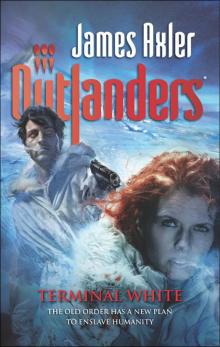 Terminal White
Terminal White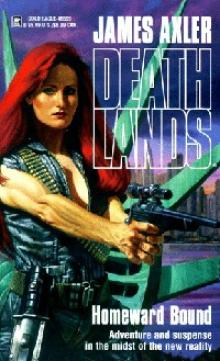 Homeward Bound d-5
Homeward Bound d-5 Blood Harvest (v5)
Blood Harvest (v5) Amazon Gate
Amazon Gate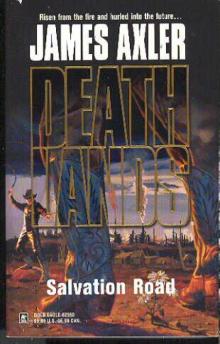 Salvation Road
Salvation Road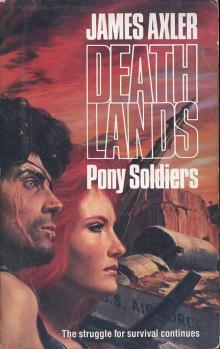 Pony Soldiers
Pony Soldiers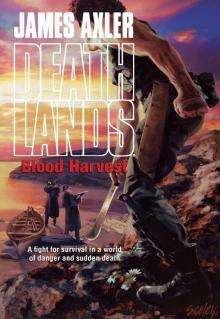 Blood Harvest
Blood Harvest Atlantis Reprise
Atlantis Reprise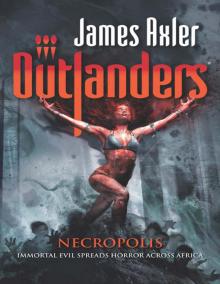 Necropolis
Necropolis Haven's Blight
Haven's Blight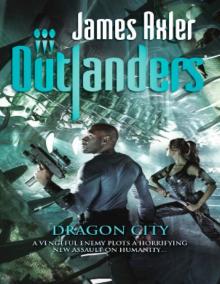 Dragon City
Dragon City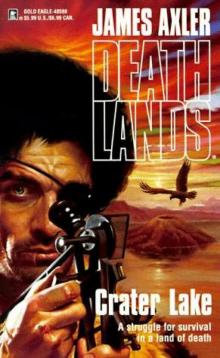 Crater Lake
Crater Lake Storm Breakers
Storm Breakers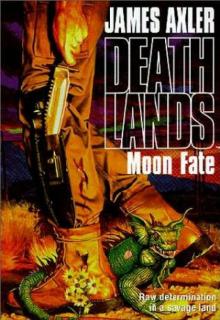 Moon Fate
Moon Fate Eden’s Twilight
Eden’s Twilight Savage Armada
Savage Armada Desolation Crossing
Desolation Crossing Time Nomads
Time Nomads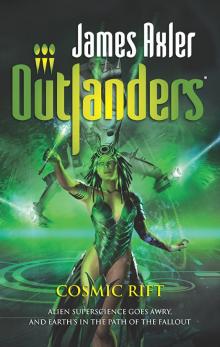 Cosmic Rift
Cosmic Rift Sins of Honor
Sins of Honor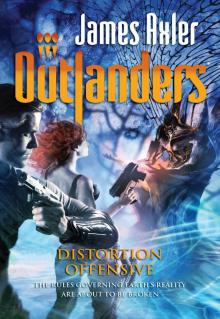 Distortion Offensive
Distortion Offensive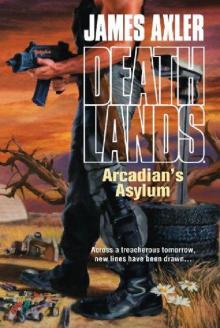 Arcadian's Asylum
Arcadian's Asylum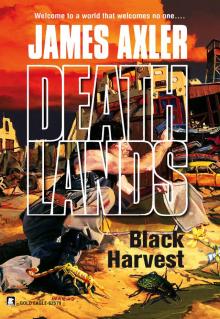 Black Harvest
Black Harvest Iron Rage
Iron Rage Nightmare Passage
Nightmare Passage Labyrinth
Labyrinth Child of Slaughter
Child of Slaughter Cannibal Moon
Cannibal Moon Tainted Cascade
Tainted Cascade Ritual Chill
Ritual Chill Sunchild
Sunchild Wretched Earth
Wretched Earth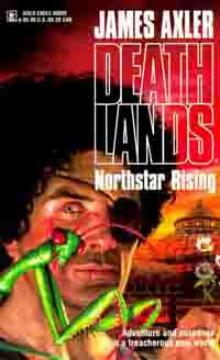 Northstar Rising d-10
Northstar Rising d-10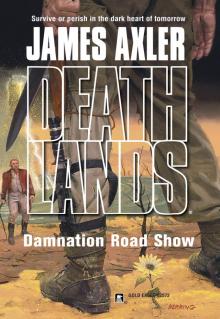 Damnation Road Show
Damnation Road Show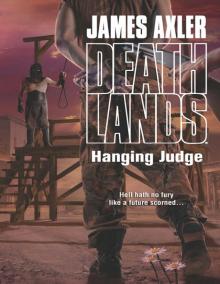 Hanging Judge
Hanging Judge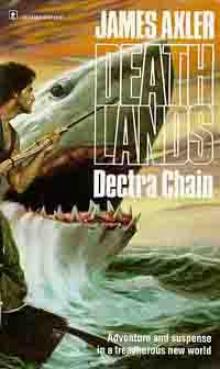 Dectra Chain d-7
Dectra Chain d-7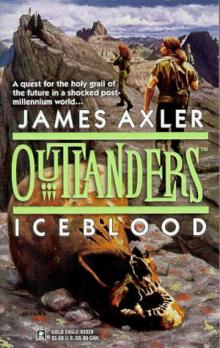 Iceblood
Iceblood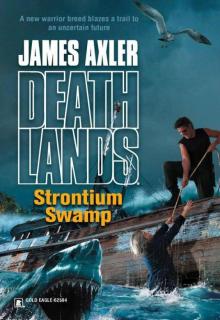 Deathlands 074: Strontium Swamp
Deathlands 074: Strontium Swamp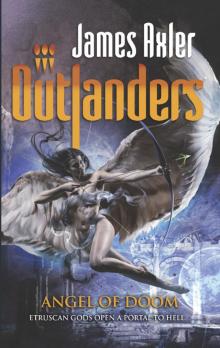 Angel of Doom
Angel of Doom Sunspot
Sunspot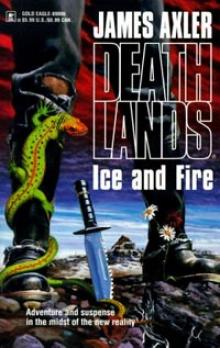 Ice and Fire d-8
Ice and Fire d-8 Pilgrimage to Hell d-1
Pilgrimage to Hell d-1 Wings of Death
Wings of Death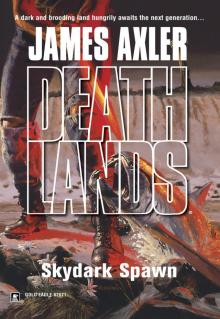 Skydark Spawn
Skydark Spawn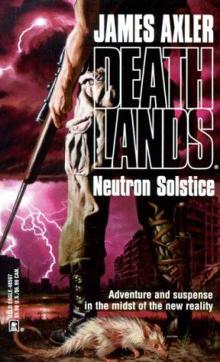 Neutron Solstice d-3
Neutron Solstice d-3 Deathlands 067: Death Hunt
Deathlands 067: Death Hunt Pilgrimage to Hell
Pilgrimage to Hell Siren Song
Siren Song Perdition Valley
Perdition Valley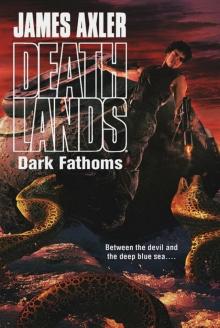 Dark Fathoms
Dark Fathoms Remember Tomorrow
Remember Tomorrow Crucible of Time
Crucible of Time Savage Armada - Deathlands 53
Savage Armada - Deathlands 53 Judas Strike - Deathlands 54
Judas Strike - Deathlands 54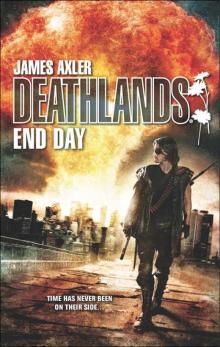 End Day
End Day Dark Resurrection
Dark Resurrection Deathlands - The Twilight Children
Deathlands - The Twilight Children Deathlands 068: Shaking Earth
Deathlands 068: Shaking Earth Breakthrough
Breakthrough Death Hunt
Death Hunt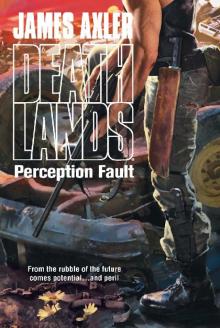 Perception Fault
Perception Fault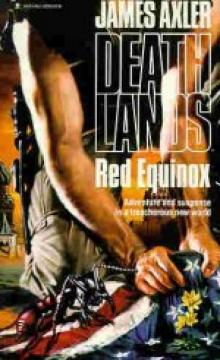 Red Equinox
Red Equinox Motherlode
Motherlode Deathlands 071: Ritual Chill
Deathlands 071: Ritual Chill Hell Road Warriors
Hell Road Warriors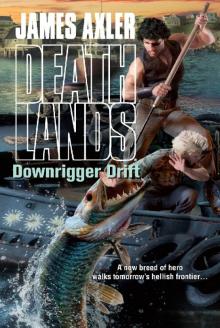 Downrigger Drift
Downrigger Drift Gaia's Demise
Gaia's Demise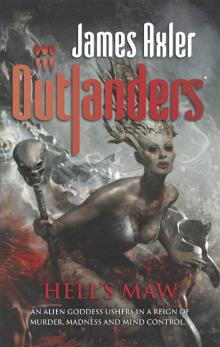 Hell's Maw
Hell's Maw Devil's Vortex
Devil's Vortex Prodigal's Return
Prodigal's Return Deathlands 122: Forbidden Trespass
Deathlands 122: Forbidden Trespass Scarlet Dream
Scarlet Dream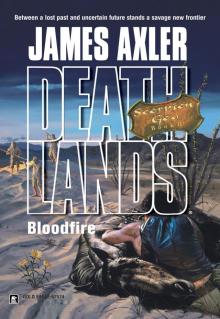 Bloodfire
Bloodfire Plague Lords (Empire of Xibalba, #1)
Plague Lords (Empire of Xibalba, #1)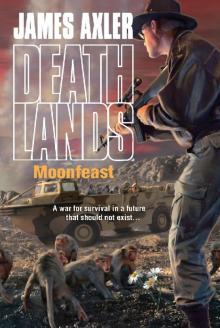 Moonfeast
Moonfeast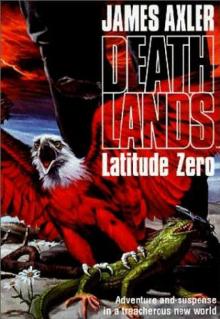 Latitude Zero
Latitude Zero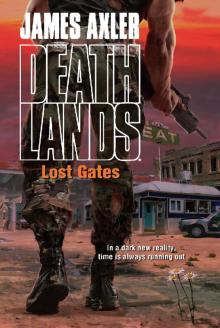 Lost Gates
Lost Gates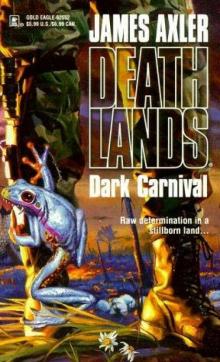 Dark Carnival
Dark Carnival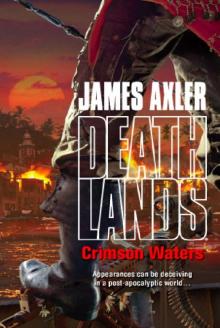 Crimson Waters
Crimson Waters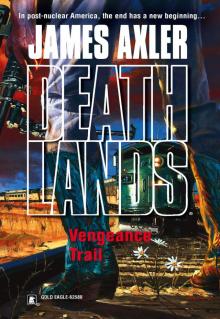 Vengeance Trail
Vengeance Trail Apocalypse Unborn
Apocalypse Unborn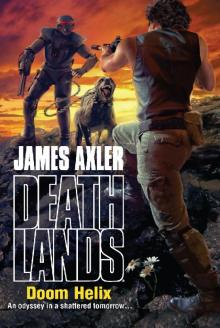 Doom Helix
Doom Helix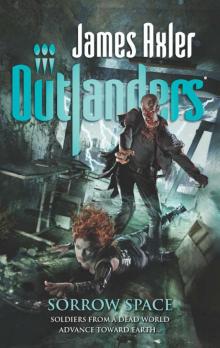 Sorrow Space
Sorrow Space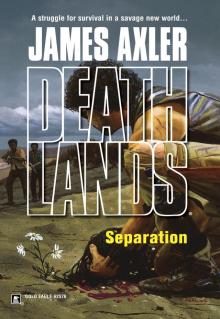 Separation
Separation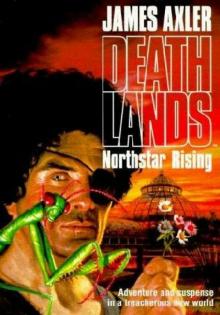 Northstar Rising
Northstar Rising Red Holocaust
Red Holocaust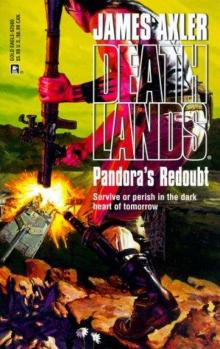 Pandora's Redoubt
Pandora's Redoubt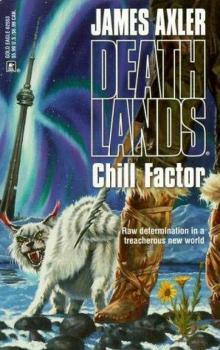 Chill Factor
Chill Factor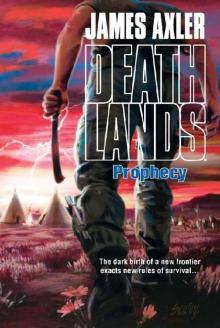 Prophecy
Prophecy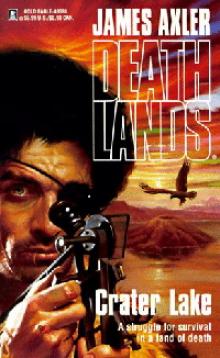 Crater Lake d-4
Crater Lake d-4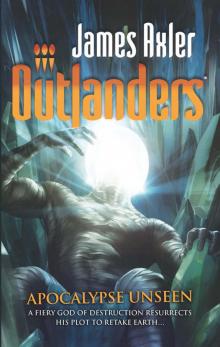 Apocalypse Unseen
Apocalypse Unseen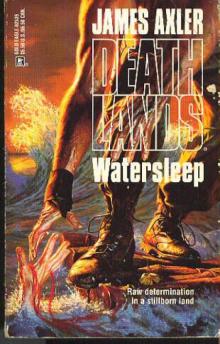 Watersleep
Watersleep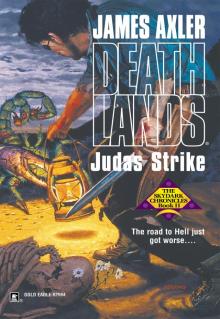 Judas Strike
Judas Strike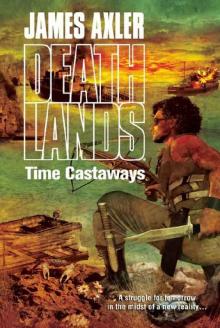 Time Castaways
Time Castaways Baptism of Rage
Baptism of Rage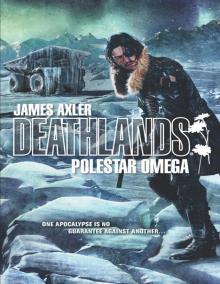 Polestar Omega
Polestar Omega Red Holocaust d-2
Red Holocaust d-2 Outlanders 15 - Doom Dynasty
Outlanders 15 - Doom Dynasty Way of the Wolf
Way of the Wolf Deathlands 075: Shatter Zone
Deathlands 075: Shatter Zone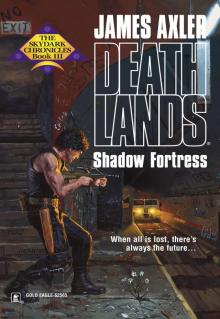 Shadow Fortress
Shadow Fortress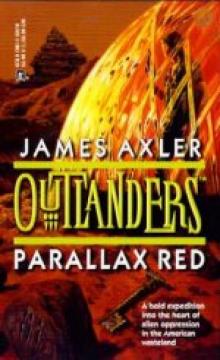 Outlander 05 - Parallax Red
Outlander 05 - Parallax Red Shaking Earth
Shaking Earth Playfair's Axiom
Playfair's Axiom Truth Engine
Truth Engine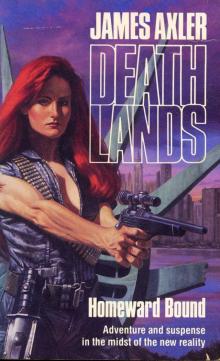 Homeward Bound
Homeward Bound Desert Kings
Desert Kings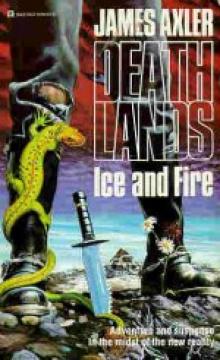 Ice and Fire
Ice and Fire Zero City
Zero City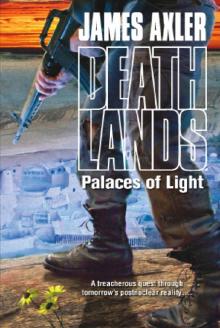 Palaces of Light
Palaces of Light No Man's Land
No Man's Land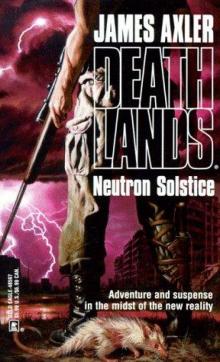 Neutron Solstice
Neutron Solstice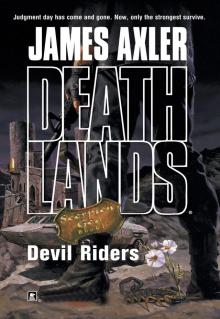 Devil Riders
Devil Riders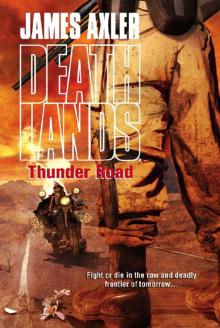 Thunder Road
Thunder Road Deathlands 118: Blood Red Tide
Deathlands 118: Blood Red Tide Deathlands 114: Siren Song
Deathlands 114: Siren Song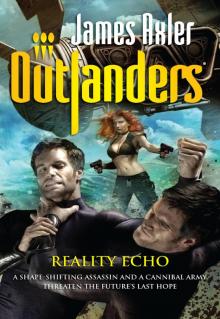 Reality Echo
Reality Echo Hive Invasion
Hive Invasion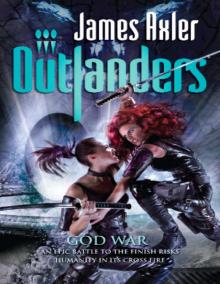 God War
God War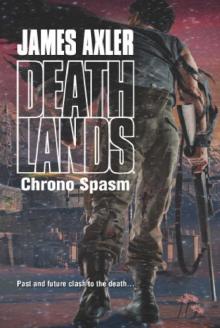 Chrono Spasm
Chrono Spasm Judgment Plague
Judgment Plague Blood Red Tide
Blood Red Tide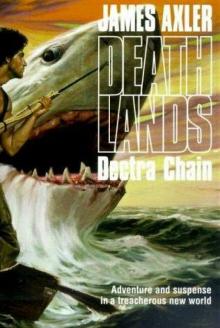 Dectra Chain
Dectra Chain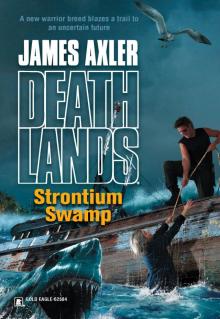 Strontium Swamp
Strontium Swamp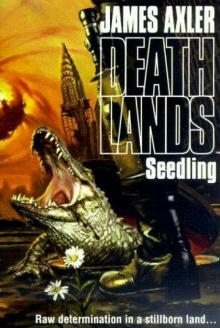 Seedling
Seedling Shatter Zone
Shatter Zone Hellbenders
Hellbenders